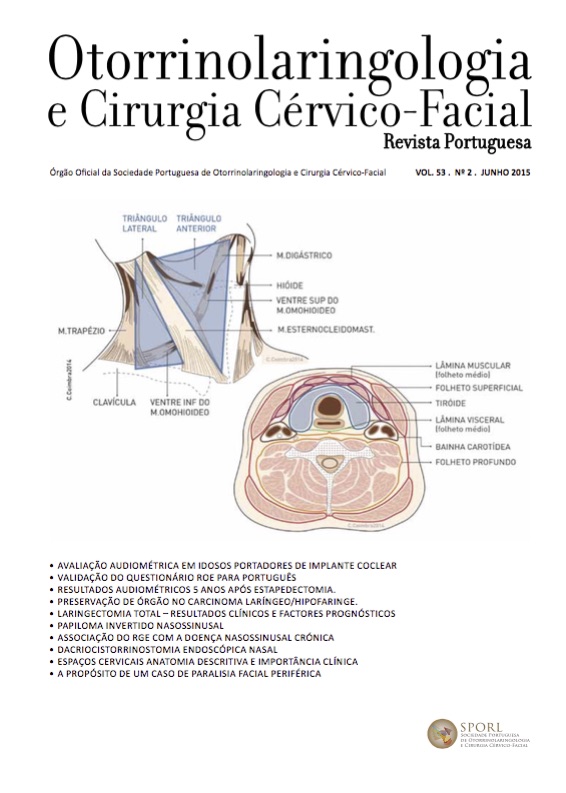Total laryngectomy - Clinical outcomes and prognostic factors
DOI:
https://doi.org/10.34631/sporl.583Keywords:
laryngeal and hypo pharyngeal tumors, advanced stage, CT scan of the neck, survival, prognostic factorsAbstract
The choice between total laryngectomy (TL) and chemoradiotherapy in the treatment of advanced laryngeal and hypopharyngeal tumors remains controversial.
Aiming to analyze clinical and functional outcomes of TL performed in our department, to identify prognostic factors and to verify the utility of computed tomography (CT) scan of the neck, we performed a retrospective study of TL performed between 2000 and 2004.
From the 378 observed patients, most of them presented laryngeal tumors (72%) in advanced stage (90%). The CT scan of the neck allowed for correct staging in only 35% of the patients. The overall 5-year disease-specific survival rate was 59,5% and the prognostic factors identified were: laryngeal tumor, N0-N1 stage and previous tracheotomy.
Given the high incidence of advanced tumors in our department and the limited value of neck CT scan, we recommend careful evaluation of such patients, in order to ensure adequate selection for chemoradiotherapy.
Downloads
References
American Cancer Society. Cancer Facts and Figures 2012. http://www.cancer.org/acs/groups/content/@epidemiologysurveilance/
documents/document/acspc-031941.pdf, Acedido em Fevereiro 16, 2012.
Johnson JT. Malignant tumors of the larynx. http://emedicine.medscape.com/article/, Acedido em Fevereiro 10, 2012.
Quon H. Hypopharyngeal Cancer. http://emedicine.medscape.com/article/, Acedido em Fevereiro 10, 2012.
Lydiatt WM, Lydiatt DD, Snyder MC. Glottic cancer. http://emedicine.medscape.com/article/, Acedido em Fevereiro 10, 2012.
Surveillance, Epidemiology and End Results (SEER) Program, National Cancer Institute. http://seer.cancer.gov/. Acedido em Fevereiro 16, 2012.
The Department of Veteran Affairs Laryngeal Cancer Study Group. Induction chemotherapy plus radiation compared with surgery plus radiation in patients with advanced laryngeal cancer. N Engl J Med 1991; 324(24):1685-90.
LoTempio MM, Wang KH, Sadeghi A, Delacure MD. Comparison of quality of life outcomes in laryngeal cancer patients following chemoradiation vs total laryngectomy. Otololaryngol Head Neck Surg 2005; 132(6(:948-53.
Instituto Nacional de Estatística. Estatísticas Territoriais. http://www.ine.pt/xportal/xmain?xpid=INE&xpgid=ine_unid_territorial&menuBOUI=13707095&contexto=ut&selTab=tab3, Acedido em Março
, 2012.
Tamura Y, Tanaka S, Asato R, Hirano S et al. Therapeutic outcomes of laryngeal cancer at Kyoto University Hospital for 10 years. Acta Otolaryngol Suppl 2007; (557):62-5.
Spector GJ, Sessiona DG, Lenox J, Newland D et al. Management of stage IV glottic carcinoma: therapeutic outcomes. Laryngoscope 2004;114(8):1438-46.
Di B, Li XM, Shang YD, Song Q et al. Outcomes of salvage laryngectomy after initial radiation failure in laryngeal squamous cell carcinoma. Zonghua Er Bi 2011; 46(6): 495-500.
Akduman D, Karaman M, Uslu C Bilaç O. Larynx cancer treatment results: survive and quality of life assessment. Kulak Burun Bogaz 2010; 20(1): 25-32.
Iseli TA, Agar NJ, Dunemann C, Lyons BM. Functional outcomes following total laryngopharyngectomy. ANZ J Surg 2007; 77(11):954-7.
Bozec A, Poissonet G, Chamorey E, Demard F et al. Results of vocal rehabilitation using tracheoesophageal voice prosthesis after total laryngectomy and their predictive factors. Eur Arch Otorhinolaryngol 2010; 267(5):751-8.
Hoffman HT, Karnell LH, Shah JP et al. Hypopharyngeal cancer patient care evaluation. Laryngoscope. Cancer 1997; 107(8): 1005-17.
Hornig J. Supraglottic Cancer. http://emedicine.medscape.com/article/, Acedido em Fevereiro 10, 2012.






